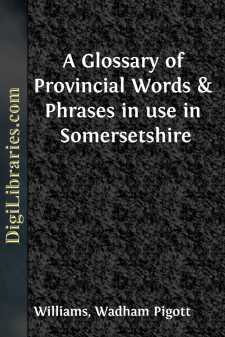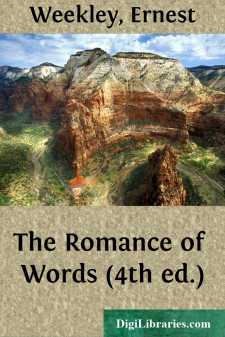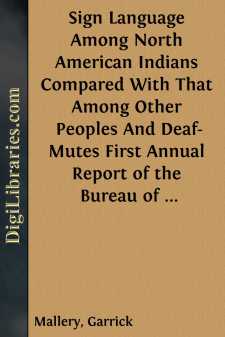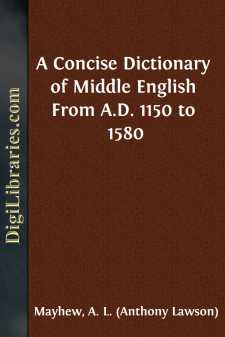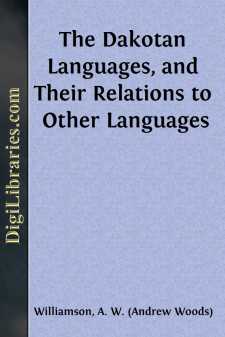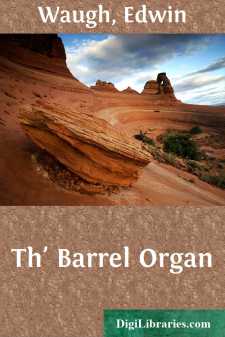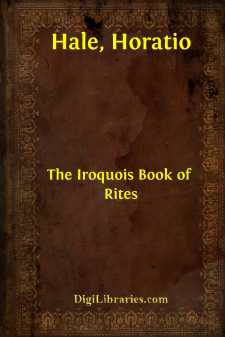Language Arts & Disciplines
Language Arts & Disciplines Books
Sort by:
INTRODUCTION The ranks of those illustrious men who a few decades ago, in war and peace, stood by the side of Emperor Wilhelm I.—of glorious memory—have gradually thinned. On the 9th of November, 1896, another of the few then surviving—Dr. Emil Frommel, Supreme Councillor of the Prussian Consistory, formerly chaplain to the Imperial Court and pastor of the “Garnisonkirche” in Berlin—closed...
more...
Preface The purpose of this book, as conceived by the author, is not to attempt to create or to influence usage by pointing out which words should or should not be used, nor to explain the meaning of terms, but simply to provide in a form convenient for reference and study the words that can be used, leaving it to those who consult its pages to determine for themselves, with the aid of a dictionary if...
more...
INTRODUCTION. The following paper from the pen of Dr. Prior was read at a Conversazione of the Society at Taunton, in the winter of 1871, and as it treats the subject from a more general point of view than is usually taken of it, we print it with his permission as an introduction to our vocabulary:— On the Somerset Dialects. The two gentlemen who have undertaken to compile a glossary of the Somerset...
more...
by:
Ernest Weekley
PREFACE A long and somewhat varied experience in language teaching has convinced me that there are still, in spite of the march of science, many people who are capable of getting intellectual pleasure from word-history. I hope that to such people this little book, the amusement of occasional leisure, will not be unwelcome. It differs, I believe, from any other popular book on language in that it deals...
more...
by:
Garrick Mallery
INTRODUCTORY. During the past two years the present writer has devoted the intervals between official duties to collecting and collating materials for the study of sign language. As the few publications on the general subject, possessing more than historic interest, are meager in details and vague in expression, original investigation has been necessary. The high development of communication by gesture...
more...
A. A-, prefix (1), adding intensity to the notion of the verb.—AS. á for ar-, ar-, Goth. us-. For the quantity of the á see Sievers, 121. Cf. . A-, prefix (2), standing for A, prep., and for Icel. á; see . A-, prefix (3), standing for Of, prep.; see . A-, prefix (4), standing for AS. and-, against, in return, toward.—AS. and-, ond-, on- (proclitic). Cf. A-, prefix (5), standing for At, prep.,...
more...
To the ethnologist and to the philologist the Dakotas and those speaking kindred languages are a very interesting people. There are four principal Dakota dialects, the Santee, Yankton, Assinniboin and Titon. The allied languages may be divided into three groups: I. a, Winnebago; b, Osage, Kaw, and 2 Quapaw; c, Iowa, Otoe and Missouri; d, Omaha and Ponka. II. Mandan. III. a, Minnetaree (Minitari) or...
more...
by:
Edwin Waugh
I came out at Haslingden town-end with my old acquaintance, "Rondle o'th Nab," better known by the name of "Sceawter," a moor-end farmer and cattle dealer. He was telling me a story about a cat that squinted, and grew very fat because—to use his own words—it "catched two mice at one go." When he had finished the tale, he stopped suddenly in the middle of the road, and...
more...
by:
Horatio Hale
CHAPTER I. THE HURON-IROQUOIS NATIONS. At the outset of the sixteenth century, when the five tribes or"nations" of the Iroquois confederacy first became known to Europeanexplorers, they were found occupying the valleys and uplands of northernNew York, in that picturesque and fruitful region which stretcheswestward from the head-waters of the Hudson to the Genesee. The Mohawks,or Caniengas—as...
more...
I.—THE PROCESS BY COMBINATION. Two or more words may be united to form a new one, or to perform the office of a new one, and four methods or stages of combination may be noted. a. By juxtaposition, where the two words are placed together and yet remain as distinct words. This method is illustrated in Chinese, where the words in the combination when taken alone seldom give a clew to their meaning when...
more...




